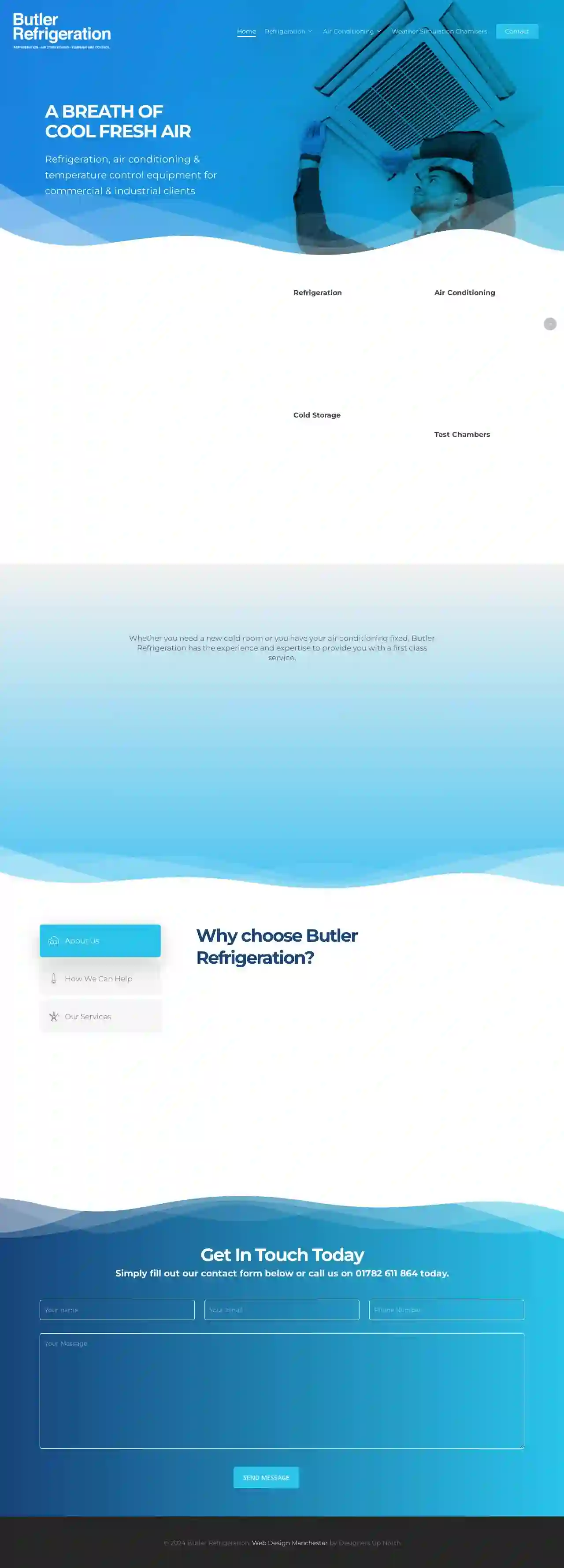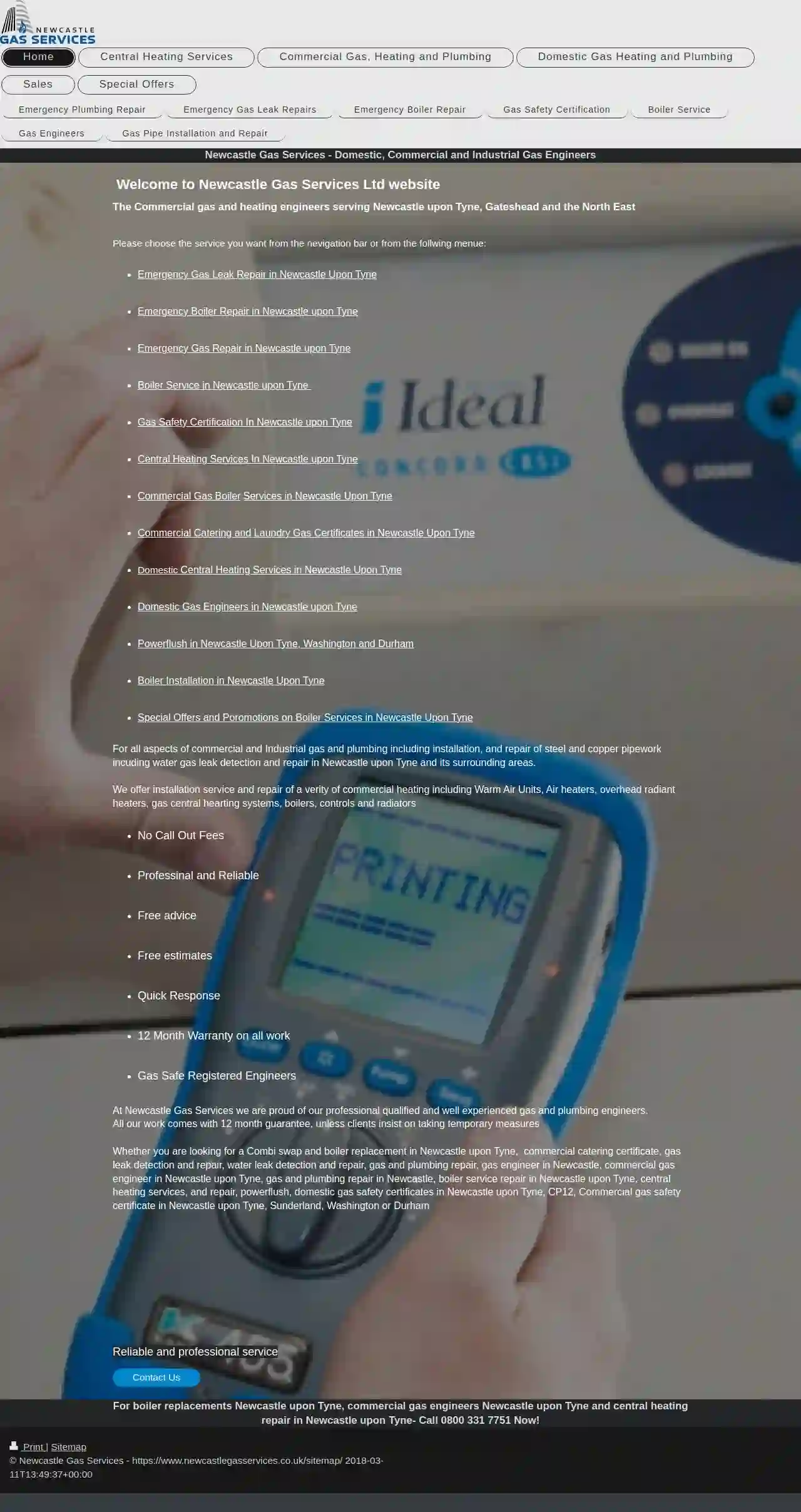Heat Pump Installation Newcastle
Find top Heat Pump Installation in Newcastle
Receive up to 3 Heat Pump Installation quotes for your project today! Compare profiles, reviews, accreditations, portfolio, etc... and choose the best deal.

Housewarm
536 reviews21 Calderdale Ave., Newcastle upon Tyne, NE6 4HN, GBHousewarm is a local business carrying out central heating services in Newcastle upon Tyne, going strong for over a decade. My name is Steven and I was born in Newcastle General Hospital in 1979. I incorporated Housewarm Limited in 2011 to provide heating and plumbing services to homes in my local hometown area. I have all the plumbing tools, knowledge and experience needed to carry out heating and plumbing jobs to a high standard. With no call out fees and free fixed price quotes, I can offer an experienced heating engineer and plumber in Newcastle at competitive prices.
- Services
- Why Us?
- Our Team
- Testimonials
- Gallery
Get Quote
Butler Refrigeration
Unit 1, The Business Centre, Parkway, stoke-on-trent, ST10 4BQ, GBButler Refrigeration, a family-run business since 1987, has been providing high-quality refrigeration, air conditioning, and temperature control equipment for commercial and industrial clients for over 28 years. With bases in Manchester and Staffordshire, we specialize in the supply, installation, and maintenance of refrigeration and other cooling units. Our team of experienced engineers, John, Mark, and Simon Butler, boasts over 100 years of combined experience in the industry. We pride ourselves on delivering a first-class service, no matter the size of the job, and building long-lasting relationships with our customers based on trust, integrity, and honesty. We understand the critical role refrigeration and air conditioning play in the success of your business. That's why we offer reliable service with trusted results, ensuring your equipment runs smoothly and efficiently. From fast and efficient repairs and servicing of all refrigeration equipment to comprehensive air conditioning solutions, including commercial, ducted, cassette, ceiling suspended, high wall, floor standing, and multi-systems, we have the expertise to meet your needs. We also specialize in bespoke programmable test chambers designed and installed to British and European standards, as well as cold storage solutions for all sizes, including blast freezers and production line cooling. We guarantee all our work and provide advice on efficient operation and preventative maintenance to minimize future breakdowns. We can also offer maintenance contracts to keep your equipment fully operational for years to come. Whether you require a single room air conditioning unit or a complete data centre solution, a small fridge repair or a large frozen food storage facility, Butler Refrigeration is your trusted partner for all your refrigeration and air conditioning needs. Contact us today for a free consultation and experience the difference.
- Services
- Why Us?
- Gallery
Get Quote
Elite heat Plumbing & Heating Engineers Ltd
521 reviewsNewcastle, GBElite Heat ltd is a family-run business serving the North East, offering affordable and professional plumbing, gas, and heating services. From fixing a leaky tap to installing a full central heating system, they handle all aspects of these services. They pride themselves on delivering high-quality work within budget and on time, with a focus on client satisfaction. Their team of experienced engineers is GasSafe registered, ensuring safety is their top priority when dealing with gas appliances. Elite Heat uses only the highest quality materials and offers a range of services, including boiler installations, repairs, and servicing, as well as radiator installations, underfloor heating, and smart thermostat installations. They also provide 24-hour call-out services for emergencies.
- Services
- Why Us?
- Accreditations
- Testimonials
- Gallery
Get Quote
Newcastle Gas Services Ltd
54 reviews123 Main Street, Newcastle upon Tyne, NE1 1AA, GBWelcome to Newcastle Gas Services Ltd website. The Commercial gas and heating engineers serving Newcastle upon Tyne, Gateshead and the North East. Please choose the service you want from the nevigation bar or from the follwing menue:Emergency Gas Leak Repair in Newcastle Upon Tyne.Emergency Boiler Repair in Newcastle upon Tyne.Emergency Gas Repair in Newcastle upon Tyne.Boiler Service in Newcastle upon Tyne.Gas Safety Certification In Newcastle upon Tyne.Central Heating Services In Newcastle upon Tyne.Commercial Gas Boiler Services in Newcastle Upon Tyne.Commercial Catering and Laundry Gas Certificates in Newcastle Upon Tyne.Domestic Central Heating Services in Newcastle Upon Tyne.Domestic Gas Engineers in Newcastle upon Tyne.Powerflush in Newcastle Upon Tyne, Washington and Durham.Boiler Installation in Newcastle Upon Tyne.Special Offers and Poromotions on Boiler Services in Newcastle Upon Tyne.For all aspects of commercial and Industrial gas and plumbing including installation, and repair of steel and copper pipework incuding water gas leak detection and repair in Newcastle upon Tyne and its surrounding areas.We offer installation service and repair of a verity of commercial heating including Warm Air Units, Air heaters, overhead radiant heaters, gas central hearting systems, boilers, controls and radiators.No Call Out Fees.Professinal and Reliable.Free advice.Free estimates.Quick Response.12 Month Warranty on all work.Gas Safe Registered Engineers.At Newcastle Gas Services we are proud of our professional qualified and well experienced gas and plumbing engineers.All our work comes with 12 month guarantee, unless clients insist on taking temporary measures.Whether you are looking for a Combi swap and boiler replacement in Newcastle upon Tyne, commercial catering certificate, gas leak detection and repair, water leak detection and repair, gas and plumbing repair, gas engineer in Newcastle, commercial gas engineer in Newcastle upon Tyne, gas and plumbing repair in Newcastle, boiler service repair in Newcastle upon Tyne, central heating services, and repair, powerflush, domestic gas safety certificates in Newcastle upon Tyne, CP12, Commercial gas safety certificate in Newcastle upon Tyne, Sunderland,Washington or Durham.Reliable and professional service.Contact Us.For boiler replacements Newcastle upon Tyne, commercial gas engineers Newcastle upon Tyne and central heating repair in Newcastle upon Tyne- Call 0800 331 7751 Now!
- Services
- Why Us?
- Gallery
Get Quote
Scotts Heating Services
4.817 reviews34 Booth Street, Newcastle, ST5 7PU, GBScott's Heating Services is a family-run business with over 20 years of experience in the plumbing and heating sector, serving Staffordshire and Cheshire. We specialize in boiler servicing and breakdowns, installations, and gas safety inspections for both domestic and commercial heating systems. Our highly skilled and qualified engineers are proficient in working on Gas, Oil, and LPG appliances. Our primary goal is to help families make their homes more energy-efficient, keeping heating bills low and ensuring their appliances function effectively year-round. Whether you need a boiler service or a full heating installation, our expert engineers can provide advice tailored to your specific needs. We are committed to providing a reliable and professional service with a friendly touch. With over 19 years in the industry, we can resolve most gas heating problems. Our services include: General Plumbing Boiler Service Boiler Repair Boiler Installation Boiler Breakdown Power Flushing Central Heating Maintenance Central Heating Upgrade Radiator Installation Unvented Systems Hot Water Cylinders Safety Certificates Landlord Certificates We prioritize clear communication with our customers throughout the entire process. For a free quote, questions, or special requests, please don't hesitate to contact us. We look forward to serving you!
- Services
- Why Us?
- Accreditations
- Our Team
- Gallery
Get Quote
Coolbreeze FM Ltd
Team Valley Trading Estate, Unit A1, The Avenues, Eleventh Avenue North, Gateshead, NE11 ONJ, GBCBFM Heating is a family-run business based in Gateshead, serving clients across the North East. With over 60 years of experience, they provide a comprehensive range of heating, plumbing, electrical, and air conditioning services. They pride themselves on their prompt and reliable service, with professional and friendly engineers who are experts in working with boilers of all makes and manufacturers. CBFM Heating offers a variety of services, including boiler service and repair, air conditioning installation, renewable energy solutions, electrical work, and plumbing services. They also specialize in commercial facilities services. CBFM Heating is committed to providing high-quality, efficient, and cost-effective solutions to meet the needs of their customers.
- Services
- Why Us?
- Gallery
Get Quote
Cool Car Air Conditioning Specialists - Newcastle
4.784 reviewsNewcastle, GBEstablished for over 35 years, we are the probably the oldest and most experienced car air conditioning specialists in the UK. We can recharge, regas, service and repair your car AC at home or place of work.
- Services
- Why Us?
- Testimonials
- Gallery
Get Quote
Gas Trade Centre Ltd TA Heat Uk
3.926 reviews48-50 Westoe Road, South Shields, NE33 4NA, GBA professional and reliable service that fits around you. Learn more about our services Book a Service When it comes to your annual boiler service, we know you want it done right by a thorough and experienced engineer. Read More Boiler Repairs There is nothing worse than your boiler breaking down – and it usually happens at the most inconvenient of times. Read More Expert Advice Our expert engineers have a wealth of experience under their tool belts and can offer professional advice on all aspects of boiler repair & maintenance. Read More Welcome to Heat UK We are a leading independent boiler service and repair specialist, serving homes in the North of England for over 40 years. We pride ourselves on delivering a high quality and first class service to our customers. Our qualified, award winning engineers will fix your boiler quickly, efficiently and with a smile to boot! So if you need your boiler fixed or repaired. Call Us 0191 456 2670
- Services
- Why Us?
- Accreditations
- Testimonials
- Gallery
Get Quote
The Boiler Co North East
511 reviews14 Dunbar Close, Newcastle upon Tyne, NE5 1JB, GBThe Boiler Co North East Ltd is a trusted gas heating engineer serving Newcastle upon Tyne and the surrounding areas. With 8 years of experience in the industry, including time spent as a manufacturer repair engineer, we specialize in boiler repairs but also offer a comprehensive range of services including boiler servicing, installation, gas safety certificates, and other gas upgrades and replacements. Our commitment is to provide a first-class service, ensuring your heating system is safe, efficient, and reliable.
- Services
- Why Us?
- Accreditations
- Gallery
Get Quote
Gallant Heating Solutions
5149 reviewsNewcastle, GBAt Gallant Heating Solutions, we offer a wide range of services at unbeatable prices. From boiler installations to plumbing work, our team of experts has over 18 years of experience in providing quality plumbing and heating services. We are Gas Safe approved, ensuring your heating system is safe in our hands. We cover all aspects of central heating work, including boiler breakdowns, thermostat installations, and more. With our quick response times and competitive prices, you can trust us to get the job done right.
- Services
- Why Us?
- Our Team
- Testimonials
- Gallery
Get Quote
Over 12,692+ HVAC Businesses onboarded
Our HVAC contractors operate in Newcastle & beyond!
HVACCompaniesHub has curated and vetted the Best HVAC Businesses in Newcastle. Find a top & trustworthy pro today.
Frequently Asked Questions about Heat Pump Installation
- Air-Source Heat Pumps: These are the most common type and extract heat from the outside air. Air source heat pumps are less expensive to install, but their efficiency can be affected by extreme outdoor temperatures.
- Geothermal Heat Pumps: Geothermal heat pumps use the stable temperature of the earth as a heat source. They are the most energy-efficient type of heat pump but also the most expensive to install due to the ground loop requirements.
- Water-Source Heat Pumps: Less common than air-source, these use a body of water (lake or well) as the heat exchange medium.
- Ductless Mini-Split Heat Pumps: Ideal for individual rooms or spaces, these systems are highly efficient and quiet.
What are the different types of heat pumps?
How do I choose the right size heat pump for my home?
How do heat pumps work in cold climates?
How long does heat pump installation take?
What are the different types of heat pumps?
- Air-Source Heat Pumps: These are the most common type and extract heat from the outside air. Air source heat pumps are less expensive to install, but their efficiency can be affected by extreme outdoor temperatures.
- Geothermal Heat Pumps: Geothermal heat pumps use the stable temperature of the earth as a heat source. They are the most energy-efficient type of heat pump but also the most expensive to install due to the ground loop requirements.
- Water-Source Heat Pumps: Less common than air-source, these use a body of water (lake or well) as the heat source or sink.
- Ductless Mini-Split Heat Pumps: Ideal for individual rooms or spaces, these systems are highly efficient and quiet.